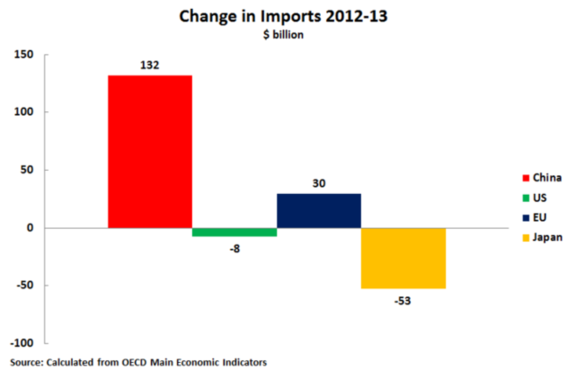China - the world's trade locomotive
- By John Ross
 0 Comment(s)
0 Comment(s) Print
Print E-mail China.org.cn, April 11, 2014
E-mail China.org.cn, April 11, 2014
Nor has this import situation altered since the Great Recession. Figure 2 shows that OECD data confirm that last year China's imports rose by $132 billion, compared to a rise of $30 billion for the EU - and falls of $8 billion for the U.S. and $53 billion for Japan. China's imports rose four times as much as the EU, while the United States and Japan were declining import markets.
| Figure 2 |
|
|
Such trends clearly have major implications for world commerce and ongoing trade negotiations.
First, the recent attempt by the United States to re-raise the question of the RMB's exchange rate was clearly unfounded. On April 8, under a self-explanatory headline "U.S. warns China after renminbi depreciation," the Financial Times carried an off-the-record briefing by a "senior [U.S.] Treasury official." This reported a 2.5 percent depreciation of the RMB since its peak earlier this year - a relatively small adjustment, clearly primarily aimed at preventing speculators having a continuous one way bet, and leaving the RMB 33.5 percent above its 2005 level. Despite this, the unnamed U.S. official declared "serious concerns" if the RMB did not show "adjustment" - apparently code for allowing its exchange rate to go up. But the trade data show clearly China has been the world's most dynamic market for other countries' exports, while last year the United States made no contribution.
That China is the world's most rapidly expanding market for other countries exports, while U.S. import markets have not regained pre-crisis levels, clearly affects China's promotion of an Asian RCEP, including India, Japan, South Korea, Australia, and ASEAN, and the United States promoting a TPP excluding China.
Regrettably, current U.S. policy has moved away from supporting a multilateral opening of the world economy. Instead, as Philip Stephens of the Financial Times noted:
"China has been the big winner from the open global economy… each of the proposed new [U.S.] agreements would leave China on the sidelines. The exclusion of the world's second-biggest economy is more than a coincidence."
The United States recognizes that a relapse into national scale protectionism, of the post-1929 type, would have disastrous consequences, including for itself, but it has been losing to China in an open and competitive world economy. A way to attempt to limit China is, therefore, to create large trade blocs including the United States rather than a truly multilateral global economy.






